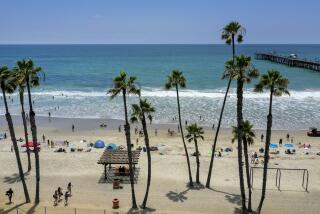Fallouja Neighborhood Suddenly Turns Fierce
- Share via
FALLOUJA, Iraq — The battle to retake Fallouja began Tuesday where Marines least expected it: near a cluster of rye fields where the locals seemed friendly and children passed the day playing soccer.
“It looks like Nebraska -- with palm trees,” said Lance Cpl. Justin Howe, 25.
Two days after cordoning off this restive city 30 miles west of Baghdad, Marines were beginning to view the quiet, residential neighborhood as relatively safe. Local farmers appeared receptive to their calls for cooperation and Marines had offered to pay compensation to a few whose property was damaged by their operations.
So when a squad of Marines emerged from behind its covered checkpoint Tuesday to begin a foot patrol, hostile fire was not what it expected.
Within seconds, everyone was diving for cover amid a barrage of bullets.
“There was fire all around my feet,” said one of the Marines in the patrol.
Three Marines were wounded, including one hit by a bullet that pierced his helmet and lodged in his head and another shot in the leg.
Tanks, Humvees and helicopters quickly arrived to attack parts of the neighborhood, destroying one building. After treating the Marine’s head injury, one serviceman grabbed his M-16 and joined the retaliatory strike.
Insurgents, meanwhile, were demonstrating a resolve of their own.
When Marines entered the neighborhood in tanks and helicopters, insurgents held their positions and fired back with rifles, mortars and small arms.
Residents reported that insurgent cells, which had been lying low in recent days, had a higher profile Tuesday, openly carrying weapons and positioning grenade launchers in the middle of the streets. One carload of Iraqis was captured while attempting to plant homemade bombs in the road.
“We will continue to resist them,” said Abu Khamis Khulaifawi, who described himself as part of the insurgency in Fallouja. “We have enough mortars, enough rocket-propelled grenades and enough light arms.”
Insurgents also appeared to have a strategy to defend the city.
They have blocked streets with buses and other vehicles in an attempt to divert military vehicles and have used an antiaircraft gun -- later destroyed -- to try to shoot down helicopters. One copter was hit by small-arms fire but not seriously damaged. The insurgents are using buses to transport fighters around the city and have darted in with cars to retrieve their dead after battles.
Falloujans set up a field hospital to stand in for the city’s main facility, which is close to Marine positions. The military estimated that at least 50 Iraqis were killed and 20 others were detained.
Some residents praised the insurgents for their tenacity.
“It seems that they have succeeded in preventing the Americans from entering the city,” said Ali Naif, a student at Al Anbar University.
But the Marines reported later that about 500 of their troops, backed by tanks and helicopters, had battled scores of insurgents to make it halfway to downtown. They said they were holding the area as a base from which they could try to retake the rest of the city.
Maj. Brandon McGowan, executive officer of the 2nd Battalion, 1st Regiment, said the Marines’ mission was going smoothly, and he was not surprised by the insurgents’ willingness to attack. In fact, he said, he was counting on it.
“If they want to come out and fight, that’s fine with us,” he said. “That way we don’t have to go house to house to find them. They’ll fall into our hands more easily.”
Staff Sgt. Eric Perry, 34, who is on his second tour in Iraq after participating in the invasion last spring, said the battle for control of Fallouja has been more challenging.
“It’s much more dangerous this time,” he said. “The other times at least you knew who your enemy was. Now you don’t know who is your friend.”
Staff writer Edmund Sanders in Baghdad and special correspondent Hamid Sulaibi in Fallouja contributed to this report.
More to Read
Sign up for Essential California
The most important California stories and recommendations in your inbox every morning.
You may occasionally receive promotional content from the Los Angeles Times.













